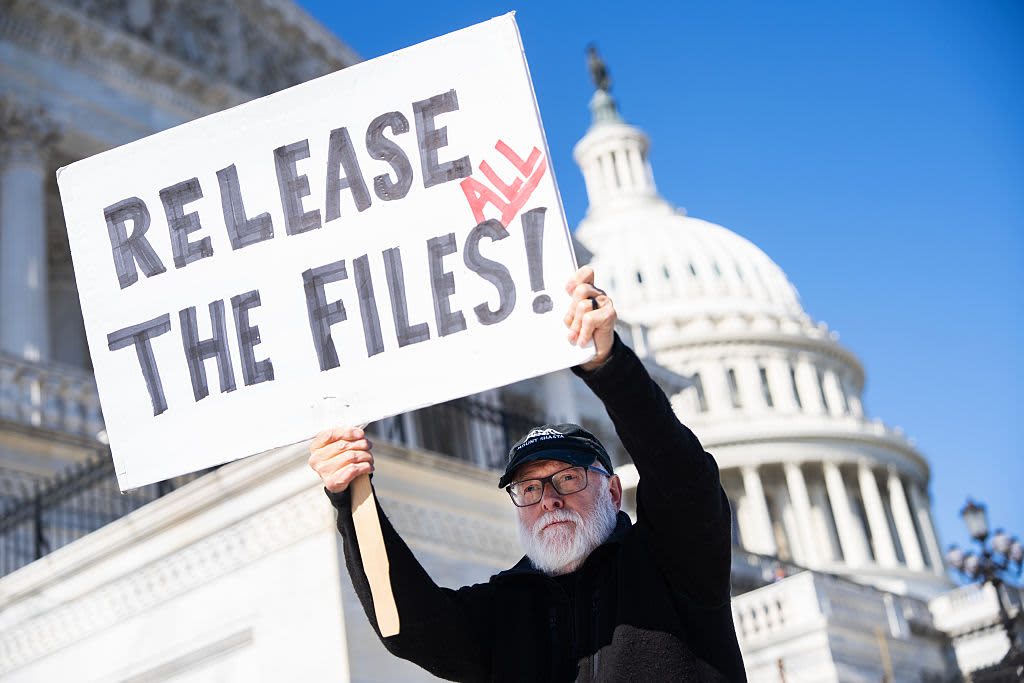
The Senate on Tuesday evening agreed to pass a bipartisan bill ordering the Department of Justice to release all of its files on notorious sex offender Jeffrey Epstein, paving the way for President Donald Trump to sign it into law.
A senior White House official told the Reuters news service that Trump will sign the Epstein bill “whenever it gets to the White House.”
The bill will automatically pass the Senate as soon as it is transferred from the House of Representatives, which earlier Tuesday approved the legislation nearly unanimously
Senate Minority Leader Chuck Schumer, D-N.Y., introduced a unanimous consent motion to consider the bill passed without debate. No senators objected to the motion.
The Senate “has now passed the Epstein bill as soon as it comes over from the House,” Schumer said with a smile. “I yield the floor.”
The House bill, brought by Reps. Thomas Massie, R-Ky., and Ro Khanna, D-Calif., had passed 427-1.
Rep. Clay Higgins, R-La., the only House member to oppose the legislation, said in an X post after the vote that he has “been a principled ‘NO’ on this bill from the beginning.”
“If enacted in its current form, this type of broad reveal of criminal investigative files, released to a rabid media, will absolutely result in innocent people being hurt,” Higgins wrote.
The push to release the Epstein files had previously faced opposition from more GOP lawmakers, following the lead of Trump, whose White House had warned that backing the effort would be considered a “hostile act.”
While Trump, in a major shift on Sunday night, urged House Republicans to vote in favor of the bill, he has continued to fume about the continued focus on Epstein in the media and on Capitol Hill.
When ABC News reporter Mary Bruce asked Trump about the Epstein files earlier Tuesday afternoon, he lashed out, repeatedly insulting her and calling for ABC’s broadcast license to be revoked.
He reiterated that the Epstein matter “is a Democrat hoax to try and get me not to be able to talk about” his administration’s accomplishments.
In a Truth Social post sent around the same time that the Senate agreed to pass the bill, Trump wrote, “I just don’t want Republicans to take their eyes off all of the Victories that we’ve had.”
Plaskett censure measure follows Epstein bill
After the House’s rare display of near-unity, lawmakers resumed fighting along partisan lines, as Rep. Ralph Norman, R-S.C., introduced a measure to censure Democratic Del. Stacey Plaskett of the U.S. Virgin Islands over her connections to Epstein.
The Washington Post last week first reported that Plaskett exchanged texts with Epstein during a congressional hearing in February 2019 with Michael Cohen, Trump’s former personal lawyer and fixer.
Copies of the texts were revealed when the House Oversight Committee released thousands of documents from Epstein’s estate. The documents include numerous emails from Epstein discussing Trump.
Plaskett, defending herself against the censure measure on the House floor, said that the messages from Epstein were among “innumerable texts” she received after one of her remarks in the hearing “went viral.”
Epstein at that time “was my constituent,” and it “was not public knowledge at that time that he was under federal investigation,” Plaskett said.
Epstein bill gathers momentum
A discharge petition that would have forced a vote on the bill earlier was delayed for weeks as House Speaker Mike Johnson, R-La., kept representatives out of session during the government shutdown. The prolonged absence also delayed the swearing-in of Democratic Rep. Adelita Grijalva of Arizona, the final signature needed to move the petition forward.
The shutdown ended last Wednesday and Grijalva, after being sworn in, signed the discharge petition. But, with pressure mounting, Johnson said he would bring the Epstein bill to a vote earlier than expected.
“Today, we stand in a moment that will decide whether our government still belongs to the American people, or to those who prey on them,” said a survivor of Epstein’s abuse who spoke alongside a group of others at a news conference outside the U.S. Capitol on Tuesday morning.
The survivors were joined by Massie, Khanna and GOP Rep. Marjorie Taylor Greene of Georgia, a longtime Trump loyalist who has recently become one of his critics.
“He called me a traitor for standing with these women and refusing to take my name off the discharge petition,” Greene said of Trump at the presser.
“Today, you are going to see, probably a unanimous vote in the House to release the Epstein files. But the fight, the real fight, will happen after that,” she said.
Johnson said later Tuesday morning that he would vote for the bill, which he acknowledged could get unanimous support. But he nevertheless accused Democrats of “forcing a political show vote on the Epstein files,” and spoke at length about his issues with the discharge petition.
One of his critiques has been that Epstein’s victims may not be adequately protected. Massie, asked earlier Tuesday about Johnson’s stance, called it a “red herring.”
“The survivors have always been in favor of this legislation,” he said, noting that the bill instructs the DOJ to redact victims’ names and identifying information.
Trump, a former friend of Epstein’s who had a falling out with him years earlier, said on the campaign trail that he would support releasing the government’s files from its investigations into the wealthy and well-connected financier. Epstein died in jail in 2019 while facing federal sex trafficking charges.
But Trump’s DOJ said in a July 6 memo that it had conducted an “exhaustive review” of Epstein-related matters and determined “that no further disclosure would be appropriate or warranted.”
That determination, and Trump’s repeated insistence that the focus on Epstein was a Democratic “hoax,” has spurred outrage across the political spectrum, including from some of Trump’s own supporters.
